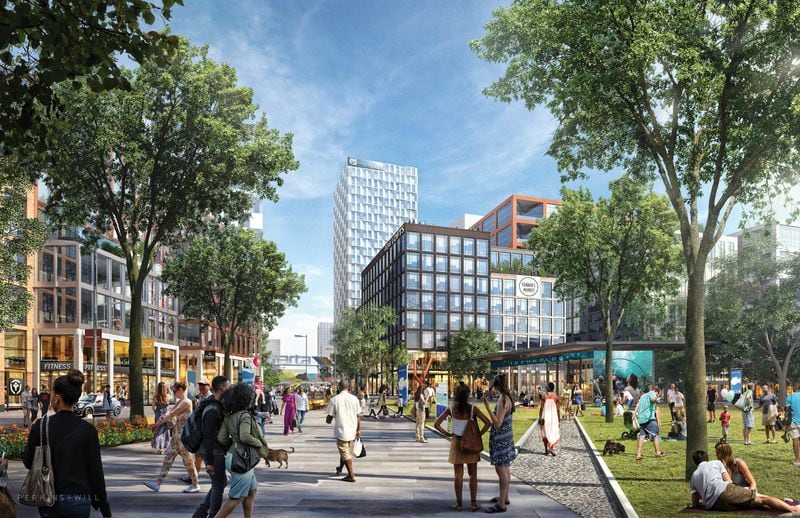Atlanta City Council members said they needed more answers about a proposed $1 billion-plus commitment of public funds to redevelop downtown's Gulch, as Mayor Keisha Lance Bottoms urged the council Tuesday to back the deal.
Bottoms noted interest in the site by Amazon for its second headquarters project, calling the company "the elephant in the room." She said the project would bring thousands of jobs to the city.
“This project is an important project to the city of Atlanta, and to miss the opportunity to make this project a reality would be fool-hearted on the part of the council and the administration,” Bottoms said.
But several members of council said they still have unanswered questions, and demanded answers and time to assess the project before a vote that could come as soon as next month.
Gulch developer CIM Group wants to build a mini-city with more than 9 million square feet of office space, 1,000 residences, 1,500 hotel rooms and 1 million square feet of retail space.
The public financing could climb to $1.75 billion if developer CIM Group’s project meets its full potential of $5 billion in new construction.
Bottoms said the deal is structured in such a way that all risk is on CIM, not the city. But several councilmembers said they feared the deal would put a strain on services before the city sees a financial windfall.
RELATED CONTENT: GULCH PROJECT
As proposed, the public funds would come from two sources, a portion of sales taxes generated on-site under a state designation known as an Enterprise Zone, and through bonds backed by the Westside Tax Allocation District (TAD).
A TAD is a zone where governments freeze property tax collections and use future expected increases in property values over many years to fund infrastructure and other improvements in that zone.
Councilman J.P. Matzigkeit, who represents Buckhead, said the general fund is at risk from the strain on police, fire and other services.
“Who would pay for those services? There’s going to be more people there,” he said.
City officials said net new sales taxes from the Gulch and future property taxes would eventually flow to the city to offset new demands on services.
But Council President Felicia Moore said that view was disingenuous.
“We need to be transparent on this,” she said. “TADs do impact the general fund. They may not be a direct expenditure of the general fund, but they do impact the general fund.”
To develop the site, CIM will have to build a 40-foot tall platform, that will create a new street grid above the rail lines to ensure continued freight and MARTA traffic. The site will include structured parking under the platform.
The platform is expected to cost about $500 million.
CIM would build and own infrastructure. Streets and parks would offer public access but not be publicly owned.
The developer committed to build a new fire station, police mini-precinct and create a permanent home for the city’s annual New Year’s Eve Peach Drop.
A plan for a long-hoped-for downtown multimodal passenger terminal is not included in CIM’s concept.
CIM committed to 200 “affordable housing units,” to be marketed for rent at values affordable for households making 80 percent of the area median income. But it’s unclear what length of time the rents would be subsidized.
Fred Smith, a newly appointed director of Invest Atlanta, the city’s economic development agency, questioned the overall public benefits in the deal.
“I encourage you to ask yourself whether that is commensurate … with the amount of [public] money that’s at stake,” he told council.
Julian Bene, an outgoing Invest Atlanta board member, said the city typically taxes commercial property at 1.9 percent of its value, and by that measure, any incentives are likely to top $2 billion.
“None of you ran in your campaigns saying you were going to spend massive amounts of public money putting offices in the Gulch,” Bene said.
Atlanta, he said, by many measures is an American city rife with economic disparity.
“We wonder why if we hand a developer $2 billion,” he said.
Gulch Redevelopment
Scope: Developer CIM Group outlined a project of $3.5 billion to $5 billion. CIM proposed more than 9 million square feet of office space, 1,000 residences, 1,500 hotel rooms and 1 million square feet of retail space.
Public investment: Documents obtained by the AJC project public financing of $900 million to $1.75 billion, though those figures could grow. It would be funded by a portion of sales taxes generated on site and bonds backed by expected future increases in property taxes.
What's next: Several pieces of legislation pertaining to Gulch redevelopment are pending. No timeline has been set for consideration, but the Atlanta City Council's next full meeting is Sept. 4.
About the Author








